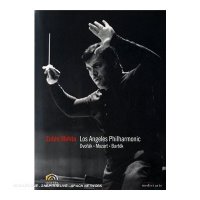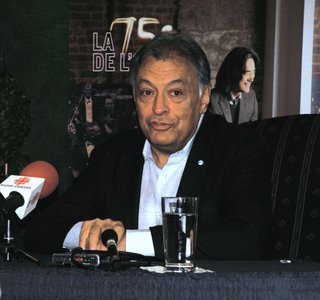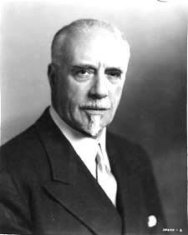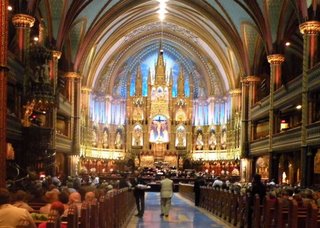 Et exspecto resurrectionem mortuorum
Et exspecto resurrectionem mortuorum was given its first performance in 1965 at the Church of
St. Chapelle in Paris and then a month later at
Chartres Cathedral. It is obviously designed to be performed in a large space with long reverberation time. The orchestra comprises only winds, brass and percussion and the music features slow-moving chords and percussion effects from various kinds of bells, gongs and tam-tams that are intended to reverberate in a large space. Notre Dame Basilica is indeed a large space, but in this case “bigger” is even better. The piece sounded wonderful in Notre Dame – especially the almost deafening percussion crescendos – but to have heard it in Chartres Cathedral would have been something else again.
Mehta conducted the Messiaen with his customary efficiency. Messiaen pupil Pierre Boulez could hardly have done better. Nor was
Et exspecto resurrectionem mortuorum the only Messiaen heard during the evening. The concert began with a performance of the early (1932) organ piece
Apparition de l’Église éternelle played by
Pierre Grandmaison. This ten-minute work begins with a series of unsettling tone clusters, but gradually out of extreme dissonance comes relief in the form of the grandest and loudest major chords one is ever likely to hear from an organ. Presumably, this is the “apparition” of the title.
Saint-Saens’ Organ Symphony Pure Sound, Beautifully Balanced
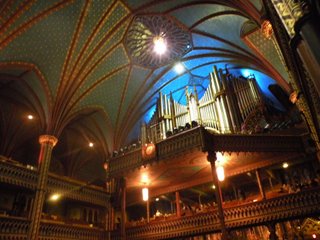
The major work on the programme - and the best-known - was Saint-Saens’ Symphony No. 3
Organ, with organist
Patrick Wedd. For all its deserved popularity, this symphony is seldom heard under ideal conditions. It is most often performed in concert halls and often with electronic organs, but this performance was the real deal and I never expect to hear it done better. I was sitting about half-way back in Notre Dame, which meant that I was about the same distance from Mehta and the orchestra in front of me and the organ console and pipes behind me. Thanks to careful preparation by the performers, balances in both soft and loud passages were just about right. Given the size of the place and the vast distance between orchestra and organ this was an amazing achievement; of course, the performers have the benefit of video cameras to see and hear each other, but it still takes musicians with sharp ears and cool nerves to make it all work.
Mehta has had a lot of experience with the
Organ Symphony. He has recorded it several times, most recently with the Berlin Philharmonic in 1997, and his view of the piece has become more refined over the years. Saint-Saens saves all the bombast for the last movement – this is the only time in the piece that the organ is allowed to play
fortissimo – and Mehta made sure that the really big guns were saved until the end. In fact, the only other section of the score where the organ plays is the second movement ‘Poco Adagio,’ and there it mostly meshes softly with the orchestra in an accompanying role.
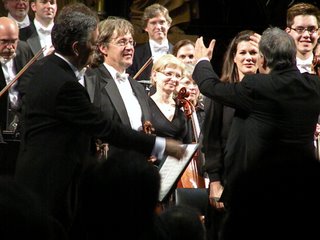
From the OSM
Mehta got all the power he needed, but also a beautifully dark and blended sound. At the same time, Mehta had obviously asked the timpanist to use hard sticks so that the important timpani solos would register clearly in the reverberant acoustic.
In both the Messiaen and the Saint-Saens, we saw a master conductor at work. Mehta is a consummate technician, but he also loves the music he plays. It was a treat to see him at work and to hear this music so well performed.
Mehta Discography, Autobiography, and a Well Deserved Award
For listeners who wish to hear more of Mehta, there is a huge catalogue of recordings and DVDs and it continues to expand with new releases almost every month. Among his recent releases are the
VPO New Year’s Concert 2007 from DG on both CD and DVD; the Israel Philharmonic’s
70th Anniversary Concert from 2007 released by Euroarts on DVD; and of special interest to those who want to see how he does it, there is a DVD called
Zubin Mehta in Rehearsal from Image Entertainment. We see Mehta rehearsing Richard Strauss’
Till Eulenspiegel with the Israel Philharmonic, followed by a complete performance. Also scheduled for release on September 30 by Medici Masters is a 1977 concert with Mehta and the Los Angeles Philharmonic under the title
Zubin Mehta: Los Angeles Philharmonic.
For more information about Zubin Mehta, his life, recordings and upcoming performances visit his website at www.zubinmehta.net.
It was announced this week that Mehta has been awarded the prestigious
Praemium Imperiale by the Japan Arts Foundation. The prize is given for lifetime achievement and is worth US$143,000. It will be officially presented in a special ceremony in Tokyo on October 15.
Finally, Mehta has recently written his
autobiography. It is available now in German (
Partitur meines Leben), Italian, and Hebrew, and the English version will be released by Amadeus Press November 15 with the title
Zubin Mehta: a Memoir.
Paul E. Robinson is the author of
Herbert von Karajan: the Maestro as Superstar and
Sir Georg Solti: his Life and Music, both available at
http://www.amazon.com/. For more about Paul E. Robinson please visit his website at
http://www.theartoftheconductor.com/.
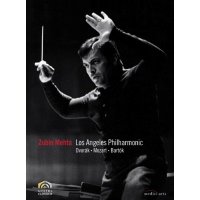 Los Angeles Philharmonic / Zubin Mehta
Los Angeles Philharmonic / Zubin Mehta